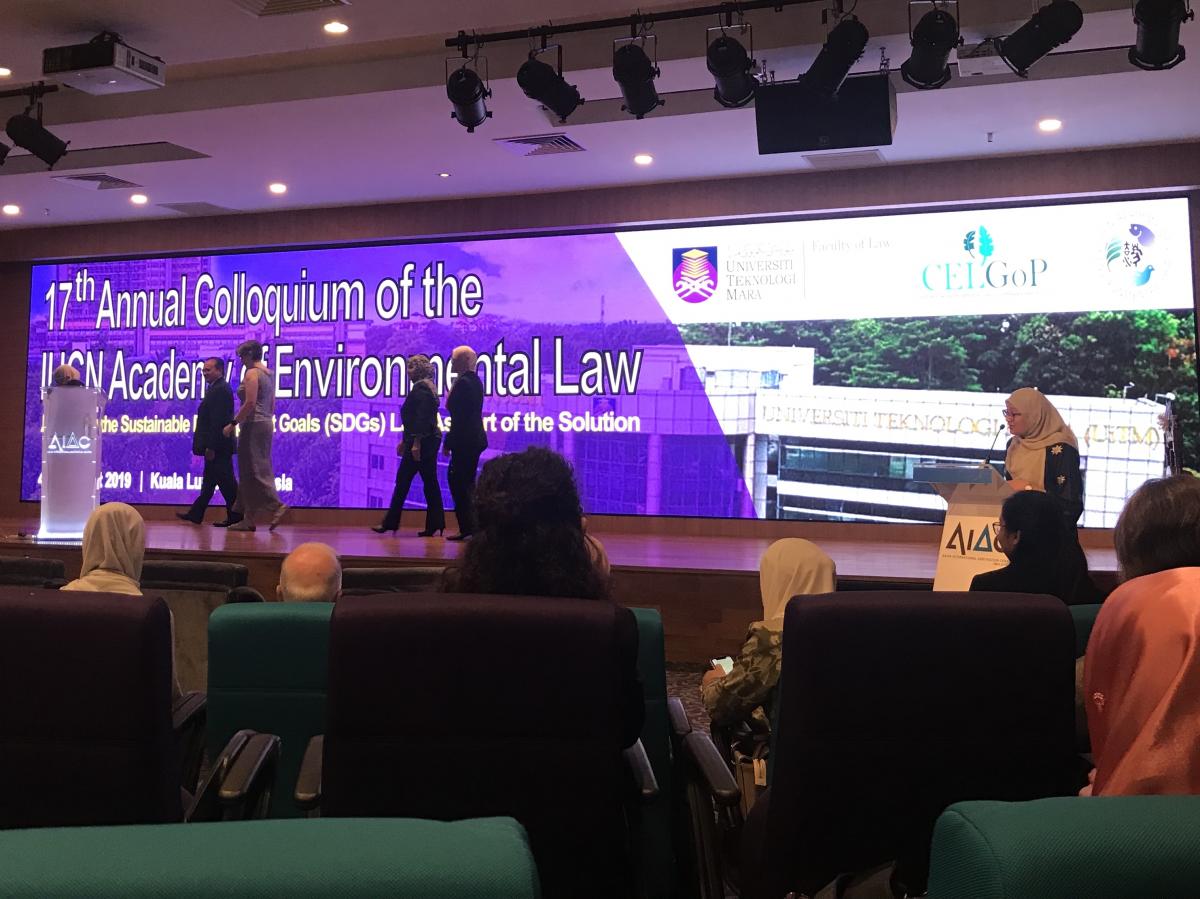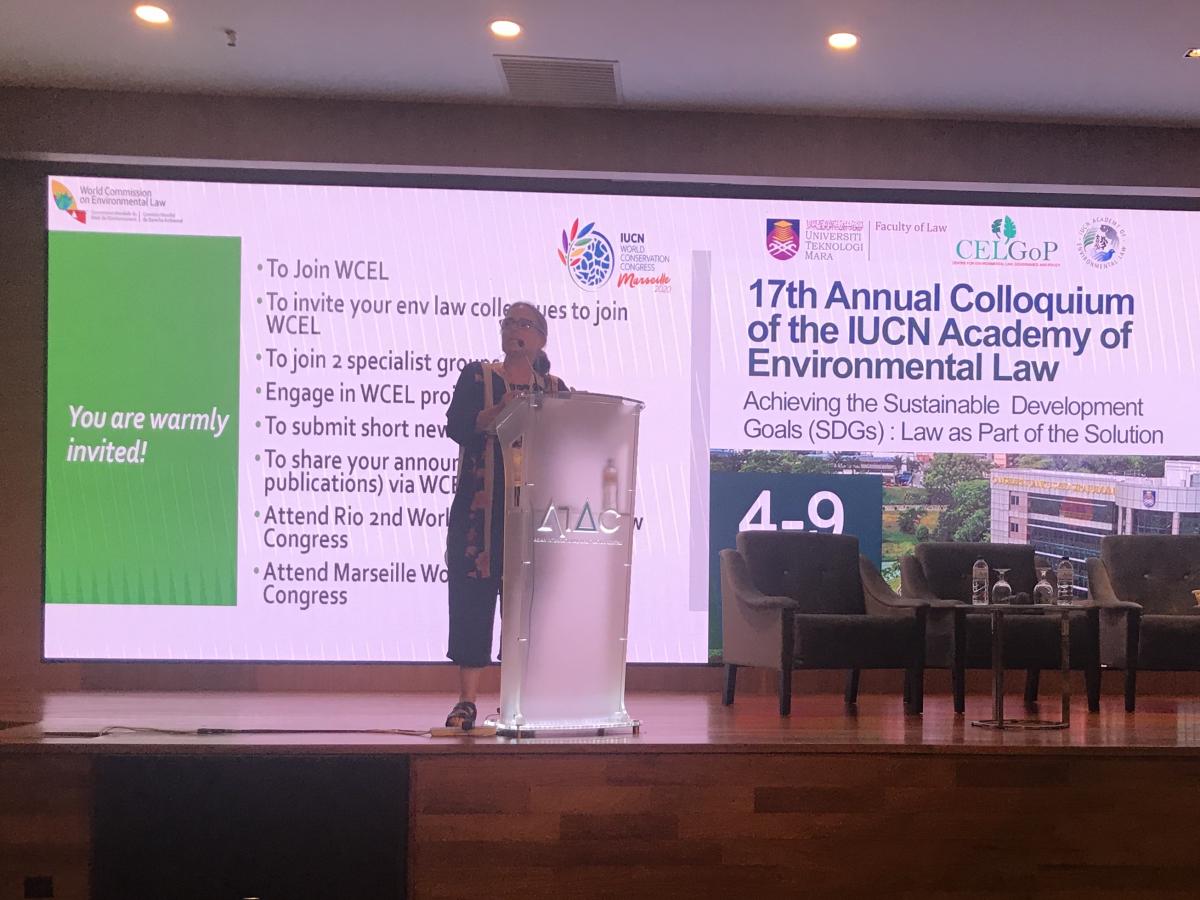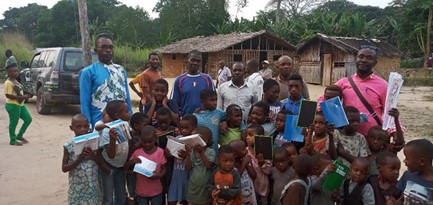17th IUCN Academy of Environmental Law Colloquium
The 17th Annual Colloquium of the IUCN Academy of Environmental Law brought together participants from all over the world to discuss current international, comparative, national, and local environmental law issues.
The 17th Annual Colloquium of the IUCN Academy of Environmental Law took place in Kuala Lumpur, Malaysia from 4 August through 7 August 2019. The event was hosted by Universiti Teknologi MARA. The theme of this year's Colloquium was “Achieving the Sustainable Development Goals: Law as part of the solution."
The IUCN Academy is made up of a network of 204 universities, law schools, and research institutions focused on environmental law, from 60 countries. The first IUCN Academy Colloquium was held in Shanghai, China in 2003. Subsequent Colloquium have been held all over the world including Scotland (2018), the Philippines (2017), and Norway (2016).
Below, Elizabeth Kirk, Chair of the IUCN Academy of Environmental Law discusses some of the achievements of the IUCN Academy, future challenges for environmental law academics, and the intersection between the Academy and the IUCN.
The IUCN Academy of Environmental Law and the World Commission on Environmental Law
The IUCN Academy and the World Commission on Environmental Law (WCEL) continue to have a close, collaborative relationship. The incoming Chair of the Academy Governing Board Rose-Liza Eisma-Osorio, will serve on the WCEL Steering Committee. WCEL Chair Antonio Benjamin serves on the Governing Board of the Academy with Deputy Chair Denise Antolini as his alternate. Many of WCEL's 1000+ individual members are part of the academic institutions that form the Academy's membership.
WCEL hosted a meeting for current and potential WCEL Members on the second day of the IUCN Academy Colloquium. Deputy Chair Denise Antolini explained the benefits of joining WCEL and articulated the partnership between WCEL and the Academy. The event drew approximately 50 participants and nearly a dozen potential members subsequently applied for WCEL membership.
Below, Jose Juan Gonzalez Marquez, Member of the IUCN Academy Governing Board discusses his history with the IUCN Academy, bringing early career professionals into the IUCN Academy, and future challenges in environmental law.
Additionally, WCEL was well represented at the IUCN Academy Colloquium with more than 60 WCEL Members in attendance. The following WCEL Members presented, moderated sessions, or delivered remarks at the IUCN Academy Colloquium:
-
Amanda Kennedy (Queensland University of Technology, Australia) Teachers’ Workshop
-
Elizabeth A. Kirk (Lincoln Law School, U) - Keynote Speech
-
David Forman (William S. Richardson School of Law, University of Hawaii at Manoa, USA) 5th Tony Oposa Intergenerational Moot Court Presentation
-
Erin Daly (Professor of Law, Widener University Delaware Law School, USA)
-
Trevor Daya-Winterbottom (University of Waikato, New Zealand)
-
Willemien du Plessis ( North-West University, South Africa) - Moderator
-
Louis J. Kotzé (North-West University, South Africa) - Moderator
-
Katie Woolaston (University of Adelaide and Queensland University of Technology, Australia)
-
Environmental Lawyers Key to Achieving Sustainability and the Sustainable Development Goals – Perspectives from Biodiversity Conservation
-
Erin Daly (Widener University Delaware Law School, USA) Environmental Rule of Law and the SDGs
-
Trevor Daya-Winterbottom (University of Waikato, New Zealand) The Future of Water
-
Louis J. Kotzé (North-West University, South Africa) The Sustainable Development Goals-An Existential Critique Alongside Three New-millennial Analytical Paradigms
-
Marina Demaria Venâncio (University of Santa Catarina, Brazil) Law and Agroecology in Brazil
-
Noor Mohammad (Bangabandhu Sheikh Mujibur Rahman Maritime University, Bangladesh) - Moderator
-
Fabiano de Andrade Correa (FAO, Brazil) - Moderator
-
Angela van der Berg (North-West University, South Africa) Can South African Planning Law and
-
Policy Promote Urban Sustainability in the Anthropocene?
-
Maša Kovič Dine (University of Ljubljana, Slovenia) Consequences of the recognition of forest protection as a common concern of humankind for the Anthropocene
-
Noor Mohammad (Bangabandhu Sheikh Mujibur Rahman Maritime University, Bangladesh) The Role of Environmental Courts for promoting public health in Bangladesh: An Empirical Study
-
Michelle Lim et al. (University of Adelaide, Australia) Charting Environmental Law Futures in the Anthropocene
-
Nadia Astriani (Universitas Padjadjaran, Indonesia) The Gap that Keeps Us Apart: Access to Clean Water, Water Quality Improvement Plan and the Disconnect of theTwo Sets of Norms
-
Elena Aydos (University of Newcastle, Australia) Reality and possibilities of waste disposal in Australia: Pursuing Sustainable Development Goal 11 in the context of the Chinese ban
-
Marina Demaria Venâncio (FAO and Federal University of Santa Catarina, Brazil) International environmental law in the Anthropocene: Addressing the gaps towards ‘sustainable development law
-
Tiina Paloniitty (University of Helsinki, Finland and Finnish Environment Institute, Finland) Reviewing All (or Some) Normative Decisions? Water Models in Finnish Judicial Review
-
Anastasia Telesetsky (University of Idaho, USA) - Moderator
-
Stefan Gruber (Kyoto University, Japan) - Moderator
-
Mingqing You (Zhongnan University of Economics and Law, China) A Game Theory Interpretation of Environmental Public Interest Litigation in China
-
Lisa Benjamin (London School of Economics and Political Science) Climate litigation –
-
regulatory lessons (for the Global North) from the Global South
-
Laely Nurhidayah (Indonesian Institute of Sciences) Coastal adaptation laws and the social justice of policies to address sea level rise: An Indonesian insight
-
Anastasia Telesetsky (University of Idaho, USA) Stemming the Tide of Marine Plastics: Are Existing Waste Management Laws and Policies Enough?
-
Stefan Gruber (Kyoto University, Japan) World Heritage in the Asia-Pacific: Controversies and Politics
-
Rob Fowler (University of South Australia) - Moderator
-
Robert V. Percival (University of Maryland, USA) - Moderator
-
Stellina Jolly (Assistant Professor of Law, South Asian University, India) - Moderator
-
Nafiseh Jafarzadeh (Macquarie University, Australia) Global Assessment and Review – A Transparency Turn in International Environmental Law
-
Erika Techera (University of Western Australia) Fisheries Governance In The Indo-Pacific: Achieving The SDGS, Environmental Justice And Food Security
-
Ben Boer (Wuhan University and University of Sydney) The SDGs and Ecological Civilisation
-
Robert V. Percival (University of Maryland, USA) Assessing the Sustainable Development Goals Through the Lens of Global Environmental Law
-
Tumai Murombo (University of the Witwatersrand, South Africa) Promoting sustainable (renewable) energy in an age of inertia: South African renewable energy Procurement
-
LeRoy Paddock (George Washington University, USA) Collaborating with Underserved Communities to Address Energy Justice and Promote Energy Democracy
-
Rob Fowler (University of South Australia) A Proposal for A New International Instrument to Support SDG 15.3 (Achieving Land Degradation Neutrality By 2030) Modelled on the Paris Agreement on Climate Change
-
Valentina Dotto (Birmingham City University, UK) - Moderator
-
Katrina Fischer Kuh (Pace University, USA) - Moderator
-
Mahito Shindo (Waseda University, Japan) Influence of the Aarhus Convention Compliance Committee on the activities of the Parliamentary Ombudsman in Ireland and Sweden
-
Samira Idllalène (Cadi Ayyad University, Morocco) Legal indicators and Islamic Environmental law in a comparative law Perspective
-
Heline Sivini Ferreira and Diogo Andreola Serraglio (Pontifical Catholic University of Paraná, Brazil) The Implementation of International Insurance As A Social Support Mechanism When Faced With Human Mobility Due to The Adverse Effects Of Climate Change
-
Valentina Dotto (Birmingham City University, UK) A new approach to law and governance: how to translate the moral claims of environmental rights into legal claims?
-
Katrina Fischer Kuh (Pace University, USA) Constitution and Climate: Evaluating the Role of Constitutional Law in Defining the U.S. Response to Climate Change
-
Erin Daly (Widener University Delaware Law School, USA) Dignity Rights and the SDGs
-
Heline Sivini Ferreira (The Pontifical Catholic University of Paraná, Brazil)
-
Volker Mauerhofer (Mid Sweden University) Addressing Biodiversity Loss Crises by strengthening Species Protection Procedures: Experiences from the European Union with Compensatory Measures
-
Jennifer McKay (University of South Australia) Australia’s proud environmental protest history under threat from current anti protest laws – law reform suggestions
-
Volker Mauerhofer (Mid Sweden University) - Moderator
-
Mrinalini Banerjee (GD Goenka University, Gurugram, India) - Moderator
-
Jonathan Liljeblad (Australian National University) Lost in Transplantation: Assessing Myanmar’s Protected Areas Reforms for Co- Management In Comparison to International Norms Nadia Astriani (Universitas Padjadjaran, Indonesia) Analysis of FORBALI (Forum Rakyat Bali Tolak Reklamasi) Movement in Bali, Indonesia to Achieve the Sustainable
-
Hitoshi Ushijima (Chuo University, Japan) Boosting Offshore Wind Power Generation in Japan Mrinalini Banerjee (GD Goenka University, Gurugram, India) Environmental Refugees: Status, Legal Impasse & the State in the Sundarban Delta
-
Paul Martin (University of New England, Australia) An evidence-based assessment of the implementation of environmental Governance
-
Anél du Plessis (North West University South Africa) Cities of the South and the Globalisation of Urban Governance: SDG 11 in Perspective
-
Volker Mauerhofer (Mid Sweden University) Integrating Sustainable Development Goals and Dimensions: de lege ferenda and de lege lata perspectives towards more environmentally just solutions







